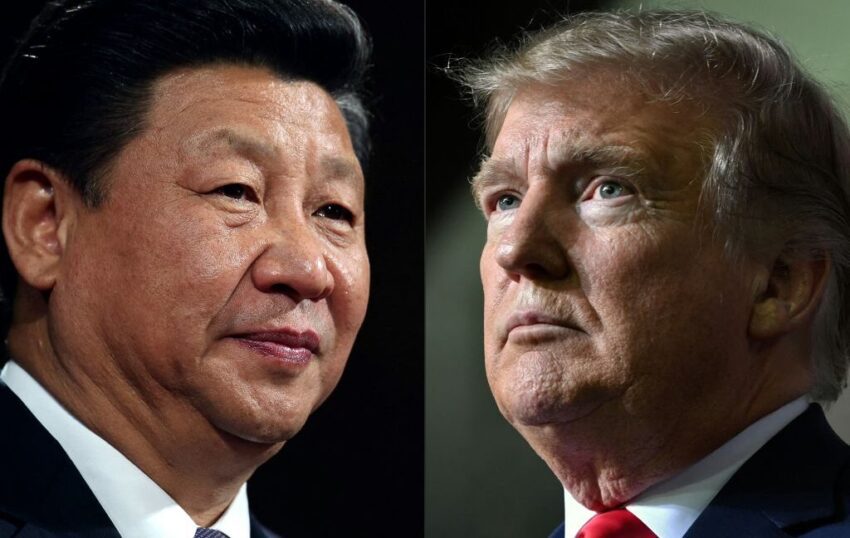
extremely angry trump threatens massive tariff on Former President Donald Trump has issued a stark warning to China, threatening a “massive increase” in tariffs on all Chinese exports amidst escalating tensions over trade practices.
extremely angry trump threatens massive tariff on
Background on U.S.-China Trade Relations
The relationship between the United States and China has been fraught with tension for years, particularly in the realm of trade. Under Trump’s administration, a trade war was initiated, characterized by reciprocal tariffs on a wide range of goods. This conflict has continued to evolve, with both nations employing various strategies to gain economic leverage over the other.
In recent months, the dynamics have shifted again, with China taking steps that the U.S. perceives as aggressive and detrimental to fair trade practices. The latest developments have prompted Trump to respond with threats of increased tariffs, a move that could have significant implications for both economies.
Trump’s Recent Threats
In a post on Truth Social, Trump expressed his frustration with China’s recent trade maneuvers, which he described as “very hostile.” He specifically pointed to China’s new restrictions on rare-earth exports and the impact these restrictions could have on U.S. companies. Rare earth elements are critical for various high-tech industries, including electronics, renewable energy, and defense.
Details of China’s Trade Moves
China’s recent actions include:
- Export Restrictions on Rare Earths: China has announced plans to impose strict export controls on rare earth materials, which are essential for manufacturing a wide range of products, including smartphones, electric vehicles, and military equipment. These restrictions are set to take effect on December 1.
- Targeting U.S. Semiconductor Companies: Reports indicate that China has targeted a key U.S. semiconductor company, further escalating tensions. Semiconductors are vital for the tech industry, and any disruption in their supply chain could have far-reaching consequences.
Trump’s accusation that China is attempting to “clog” markets reflects a broader concern that these measures are designed to limit U.S. access to critical materials and technologies. By restricting exports, China could potentially gain leverage in upcoming negotiations with the U.S.
Implications of Increased Tariffs
The potential for a “massive increase” in tariffs on all Chinese exports raises several questions about the future of U.S.-China trade relations. If implemented, these tariffs could have significant economic repercussions for both nations.
Impact on the U.S. Economy
Increased tariffs could lead to higher prices for consumers in the United States. Many products that Americans rely on, from electronics to clothing, are manufactured in China. A rise in tariffs would likely result in manufacturers passing on the costs to consumers, leading to inflationary pressures.
Moreover, U.S. companies that rely on Chinese imports for raw materials or components may face disruptions in their supply chains. This could hinder production and lead to job losses in industries that depend on affordable imports.
Impact on the Chinese Economy
On the other hand, China could also feel the sting of increased tariffs. The Chinese economy is heavily reliant on exports, and a significant reduction in U.S. demand could lead to economic slowdowns. Additionally, retaliatory measures from China could further escalate the trade conflict, creating a cycle of tariffs and counter-tariffs that could harm both economies.
Reactions from Stakeholders
The reactions to Trump’s threats have been varied, with stakeholders from different sectors weighing in on the potential consequences of increased tariffs.
Business Leaders
Many business leaders have expressed concern over the uncertainty that increased tariffs could bring. The tech industry, in particular, has been vocal about the potential disruptions to supply chains. Executives from major tech companies have urged the government to seek diplomatic solutions rather than resorting to tariffs, which they believe could stifle innovation and growth.
Political Reactions
Political reactions have also varied. Some Republican lawmakers support Trump’s tough stance on China, arguing that it is necessary to protect American jobs and industries. Conversely, some Democrats have criticized the approach, suggesting that it could lead to unnecessary economic hardship for American consumers and businesses.
Upcoming Trade Talks
Trump’s threats come just weeks before a scheduled meeting with Chinese President Xi Jinping in South Korea. This meeting is seen as a critical opportunity for both leaders to address ongoing trade issues and seek a resolution to the escalating tensions.
Potential Outcomes of the Meeting
The upcoming meeting could yield several outcomes:
- Diplomatic Resolution: There is a possibility that both leaders could reach a diplomatic resolution that addresses the concerns surrounding rare earth exports and semiconductor access.
- Increased Tensions: Alternatively, if Trump follows through on his tariff threats, it could lead to heightened tensions and a breakdown in negotiations.
- Retaliatory Measures: China may respond with its own tariffs or restrictions, further complicating the trade landscape.
Conclusion
The situation between the U.S. and China remains fluid, with Trump’s recent threats adding another layer of complexity to an already tense relationship. As both nations navigate their economic interests, the potential for increased tariffs looms large, with implications that could reverberate across global markets.
As the scheduled meeting between Trump and Xi approaches, stakeholders from various sectors will be watching closely to see how these developments unfold. The outcome could shape the future of U.S.-China trade relations for years to come.
Source: Original report
Was this helpful?
Last Modified: October 11, 2025 at 1:36 am
1 views















